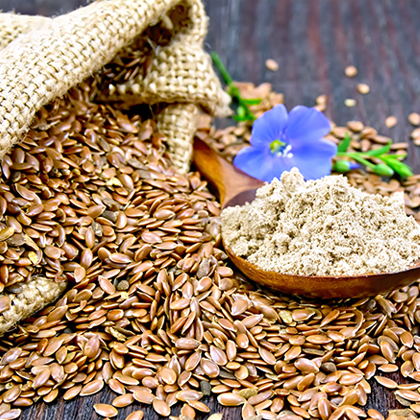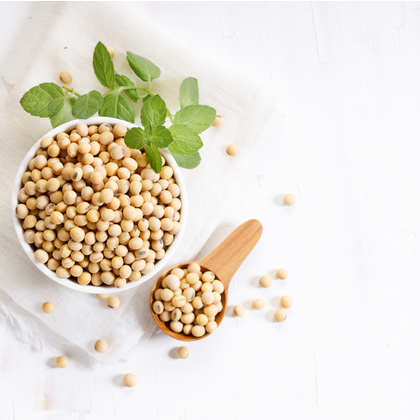
Scientifically known as salvia, sage is a member of the mint family. With over 900 varieties, this plant has long been recognised for its therapeutic properties. For generations, sage preparations have been used to support menopausal health, with a particular focus on reducing the frequency and severity of hot flushes.
Of all the menopausal symptoms, women often find that hot flushes are the most challenging, interfering with daily life, compromising emotional health, and disrupting sleep. A hot flush can happen at any point during the day or night, and is often described as an intense and sudden feeling of heat that radiates throughout the body. You can learn more about the symptoms of hot flushes here.
Here, we uncover how sage may be a helpful treatment for night sweats and hot flushes in menopause.
What does sage do for menopause?

Experts believe sage has mild phytoestrogenic properties (1). Phytoestrogens are plant-based compounds that naturally mimic oestrogen in the body. Since oestrogen starts to decline in perimenopause, phytoestrogens, like sage, have received increasing traction for their beneficial health effects at this time.
Discover eight more oestrogen rich foods for menopause here.
What does the science say?
In a 2011 study, researchers evaluated the efficacy and safety of using sage to support the reduction of hot flushes by giving a group of women a sage preparation in tablet form for eight weeks (2). After four weeks, around half of the participants observed a notable reduction in hot flushes; after eight weeks, 64 per cent saw a decrease in symptoms. The authors concluded that sage supplementation reduced hot flushes every week, and, remarkably, ceased severe hot flushes altogether.
A 2016 clinical study conducted on 100 menopausal women complaining of hot flushes reported similar findings (3). Researchers divided the participants into two groups: the first took three sage tablets (100mg) daily for eight weeks; the second took the placebo daily for the same period. At the end of the trial, the frequency, duration, and intensity of hot flushes and night sweats substantially reduced in the sage group compared to the control. The authors noted that sage could be considered an effective and safe alternative to hormone replacement therapy (HRT) for women who can not take it.
Most recently, in 2019, researchers found more data substantiating these conclusions. In a small clinical trial, researchers gave 30 women, aged between 44-58, 100mg capsule of sage extract daily for four weeks. The severity of each woman’s symptoms was compared before and after the supplementation period. At the end of the investigation, the authors reported a significant reduction in the severity of night sweats and hot flushes, along with fatigue and panic. As with the previous studies, researchers observed that sage was an effective treatment to reduce hot flushes (4).
What is the best way to take sage?
Sage is available as an essential oil, a tea, and in capsule form. It should be noted that only sage supplementation has been studied for its role in menopausal symptoms. So, to support your health at this time, look for quality, high-grade standardised sage in a formula that delivers around 2500mg.
What are the side effects of sage?
If consumed in excess, sage can potentially cause serious side effects. Sage contains a neurotoxin called thujone, which is responsible for intoxicating properties of the alcoholic drink, absinthe. Some of the side effects include vomiting, dizziness, tremors, restlessness, and kidney damage. You should always follow the guidance on sage supplements and never exceed the recommended dose.
Sage essential oil is also toxic, where twelve drops or more may cause adverse symptoms (5). With this in mind, never consume sage essential oil orally, and always dilute when using topically.
Excessive use of sage may also negatively impact the efficacy of anticonvulsant drugs and interfere with diabetes medication.
As with any herbal preparation, you should always consult your doctor before taking a new supplement, so you can be fully aware of any risks involved.
Visit the rest of our dedicated Menopause hub for more information. Here, you can discover how other natural remedies, like magnesium, vitamin D, and soya isoflavones, may benefit your health and wellbeing as you navigate this hormonal transition.
References:
-
Monsefi . M, Nadi. A, Alinejad. Z. The effects of Salvia officinalis L. on granulosa cells and in vitro maturation of oocytes in mice. International journal of reproductive biomedicine. 2017;15(10):649-660.
-
Bommer . S, Klein. P, Suter. A. First time proof of sage’s tolerability and efficacy in menopausal women with hot flushes. Advances inTherapy. 2011;28(6):490-500.
-
Kiani Rad S. et al., The effect of salvia officinalis tablet on hot flashes, nightsweating, and estradiol hormone in postmenopausal women. International Journal of Medical Research & Health Sciences. 2016;5:257-263.
-
Dadfar. F., Bamdad K., The effect of Saliva officinalis extract on the menopausal symptoms in postmenopausal women: An RCT. International Journal of Reproductive BioMedicine. 2019;17(4):287-292.
-
Nccih.nih.gov. Available online: https://www.nccih.nih.gov/health/sage
You Might Also Like
Disclaimer: The information presented by Nature's Best is for informational purposes only. It is based on scientific studies (human, animal, or in vitro), clinical experience, or traditional usage as cited in each article. The results reported may not necessarily occur in all individuals. Self-treatment is not recommended for life-threatening conditions that require medical treatment under a doctor's care. For many of the conditions discussed, treatment with prescription or over the counter medication is also available. Consult your doctor, practitioner, and/or pharmacist for any health problem and before using any supplements or before making any changes in prescribed medications.

Olivia
Olivia Salter has always been an avid health nut. After graduating from the University of Bristol, she began working for a nutritional consultancy where she discovered her passion for all things wellness-related. There, she executed much of the company’s content marketing strategy and found her niche in health writing, publishing articles in Women’s Health, Mind Body Green, Thrive and Psychologies.
View More






